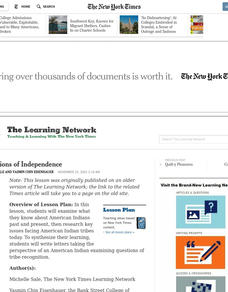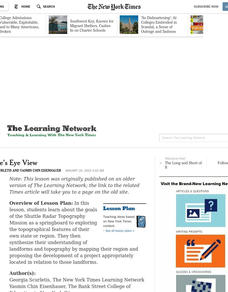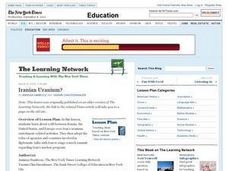Curated OER
Black, White and Digitized All Over
Students examine the pros and cons of getting news from print newspapers and from their online counterparts, compare and contrast a printed newspaper with its online version, and then compose letters to editors of print and online...
Curated OER
Full Court Press
Students investigate the Supreme Court's role and function in the federal government and examine how Chief Justice Rehnquist's illness might affect the future of the Court. They write letters to President Bush on the Supreme Court...
Curated OER
Air Conditioning
Students explore the roles that the United States government agencies play in weather forecasting, climate control, and other climate-related environmental issues. They then write letters to President Bush recommending how a new National...
Curated OER
Nurturing Nature
Students identify environmental problems and their causes. They explore some of the ways environmental problems are currently being addressed.
In groups students explore causes, possible prevention methods, and laws and regulations...
Curated OER
Take Me Out of the Ballgame
Students examine their own views on cheating. They explore the history of cheating in baseball by reading and discussing the article "Cheating Matters (Sometimes)." They create proposals for an exhibit that documents and explains the...
Curated OER
"What is an American?"
Eleventh graders ponder about what it means to be an "American." They discuss the impact of an author's word choice and sentence structure on text. They identify some major themes and development of the Letters... Compose paragraphs and...
Curated OER
Our Illuminated Alphabet
Students examine artwork and create their own. For this writing and illustrating lesson, students view illuminated letters from the Getty Museum's collection and discuss art vocabulary. Students examine the visual elements in...
Curated OER
Thomas Jefferson's Library: Making the Case for a National Library
Students examine the need for a national library. In this Library of Congress lesson, students analyze primary sources to investigate the persuasive techniques that Thomas Jefferson used in a letter meant to show his...
Curated OER
Alarm as the Clock Ticks Toward 2000
Students explore how various people and businesses are reacting to the potential technological problems that may occur when the year 2000 arrives. They read and compare two related New York Times articles and share their own views of the...
Curated OER
Discord in Dixieland
Students brainstorm businesses located in their community, and whether or not their community has been affected by the introduction of chain stores. Students debate the effects that chain retailers have on local businesses and...
Curated OER
Because of Winn-Dixie The Movie vs. The Book
In this Because of Winn Dixie worksheet, students use the provided graphic organizer to compare and contrast the book by Kate DiCamillo and the movie based on the book. Students also respond to 2 short answer questions.
Curated OER
Declarations of Independence
Learners examine what they know about American Indians past and present, then research key issues facing American Indian tribes today. To synthesize their learning, students write letters taking the perspective of an American Indian.
Curated OER
The Three Branches of Government
Young scholars complete a unit on the three branches of government. They compare/contrast the three branches of government, write a letter or e-mail to an executive in the Federal Government, and develop outlines for historical documents.
Curated OER
Trading Places
Students examine the tactics used by groups in the United States to lobby Congress. After reading an article, they discuss the efforts of unions and businesses to lobby Congress regarding the vote on China's trading relations with the...
Curated OER
Advise and Consent
Middle schoolers survey people of the community to collect opinions regarding a problem. In this philanthropic lesson, students understand the philosophy of Andrew Carnegie about giving back. Middle schoolers study a problem and propose...
Curated OER
Bootleg Bytes
Students conduct background research to explore the positions of different groups involved in the digital piracy debate, then participate in a fishbowl discussion that seeks to find a consensus on the issue.
Curated OER
A Test Case for Individual Rights
Students examine the different points of view regarding testing students for drug use. They then work in pairs to create and perform dialogues that flesh out two sides of the argument around this controversial issue.
Curated OER
Separate But Equal Opinions
Students examine the ways in which editorials and Op-Ed pieces respond to current events. They write editorials in response to news items from the New York Times.
Curated OER
A Shuttle's Eye View
Students explore the goals of the Shuttle Radar Topography Mission as a springboard to exploring the topographical features of their own state or region. They synthesize their understanding of landforms and topography by mapping their...
Curated OER
Fire Escape
Students explore the effects of the volcanic eruption of Nyiragongo in Congo as a springboard to exploring past examples of volcanic eruptions and their respective relief efforts.
Curated OER
A Snapshot Of Fame
Students debate the limits to celebrity privacy and to paparazzi rights after learning about some recent incidents. They imagine how their private lives might change if they became overnight celebrities.
Curated OER
Taking From the Giving Tree
Students explore the ways in which various American cities negotiate the protection of their "green infrastructure," gaining a broader understanding of proposed and enacted legislation as it relates to preserving and planting trees in...
Curated OER
Iranian Uranium?
Young scholars explore how Iran's uranium enrichment-related activities has caused a rift between Russia, the United States, and Europe. They stage a mock summitt to discuss Iran's nuclear program.
Curated OER
All Those In Favor
Learners share opinions about measures recently passed in their school, vote on and argue for and against hypothetical school policies, and respond to a "president's" decision to pass or veto the measures.

























